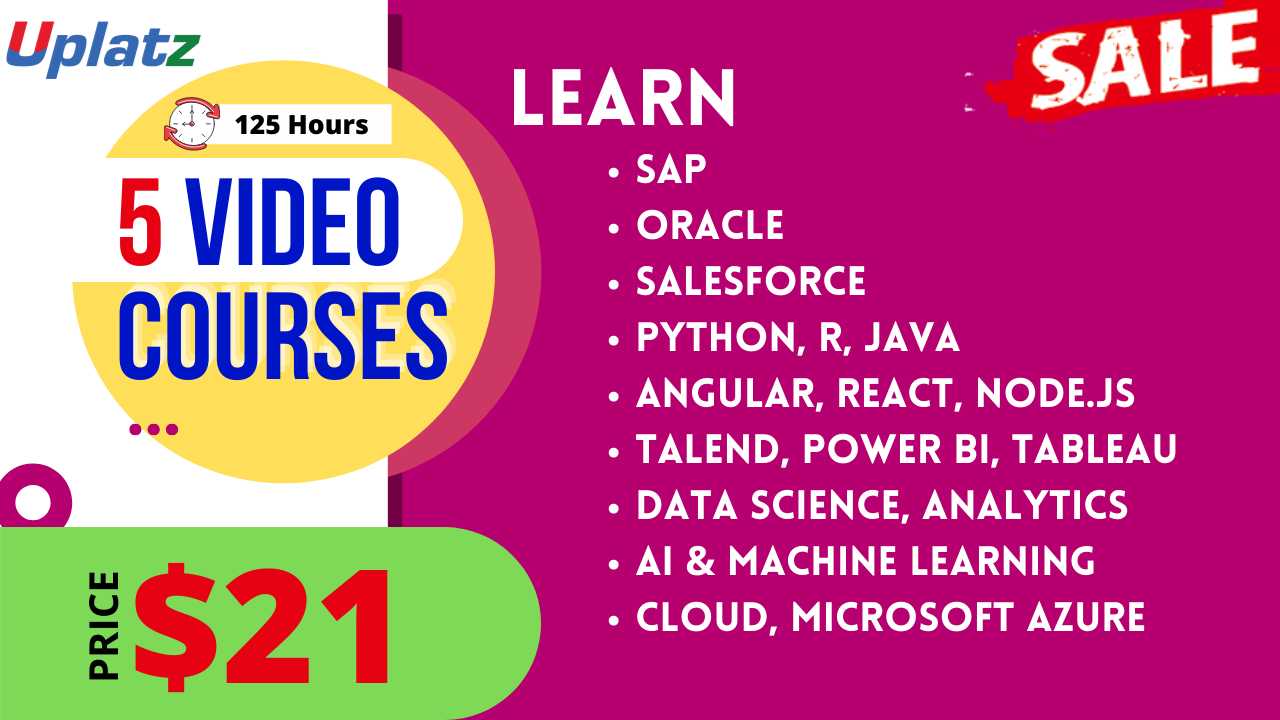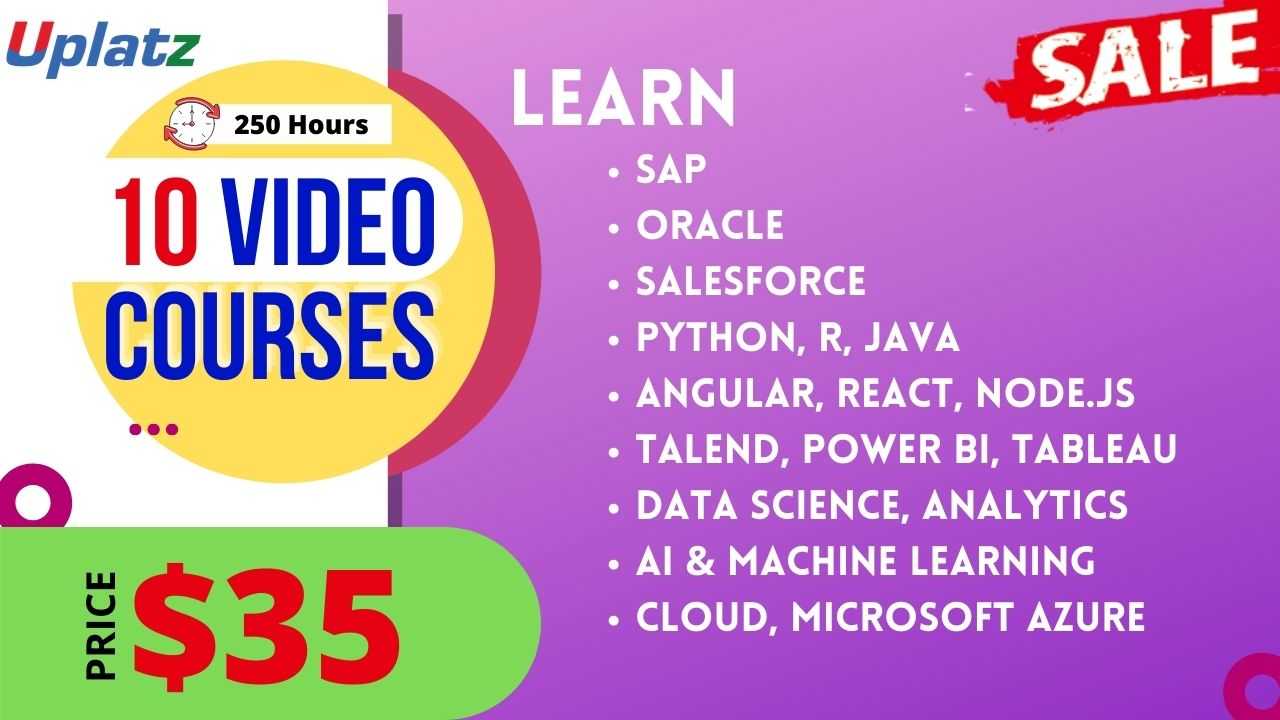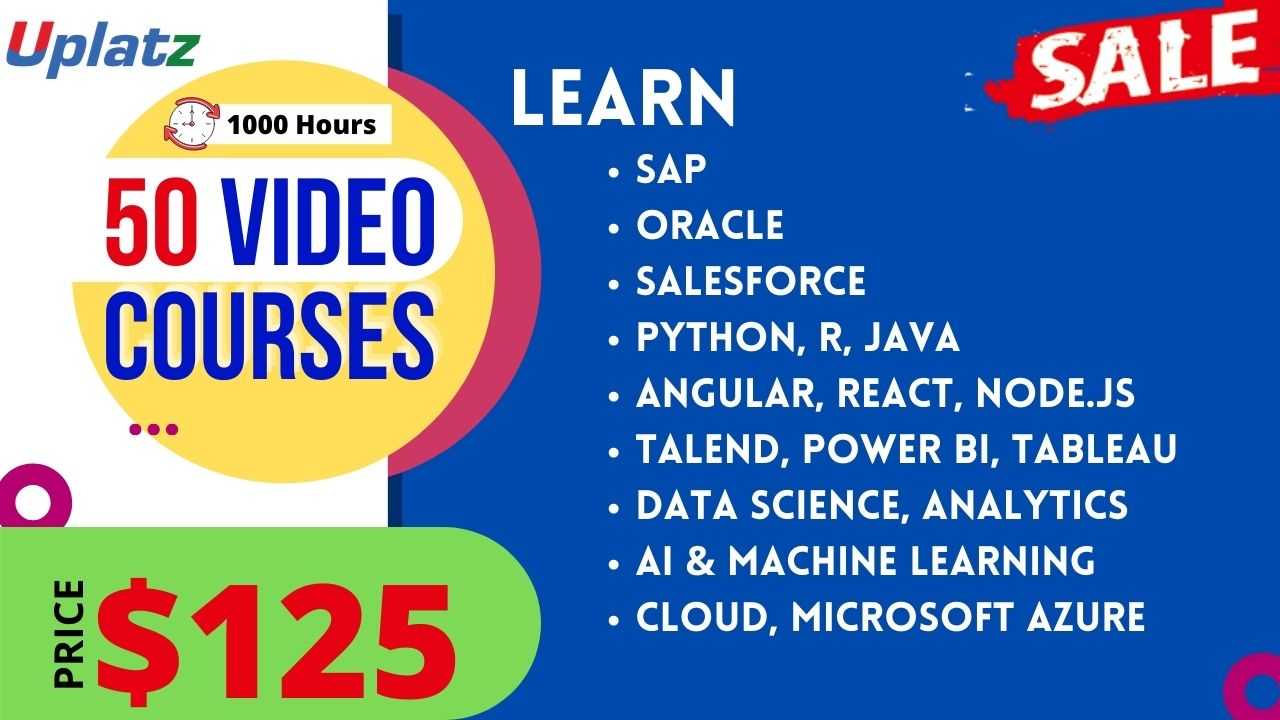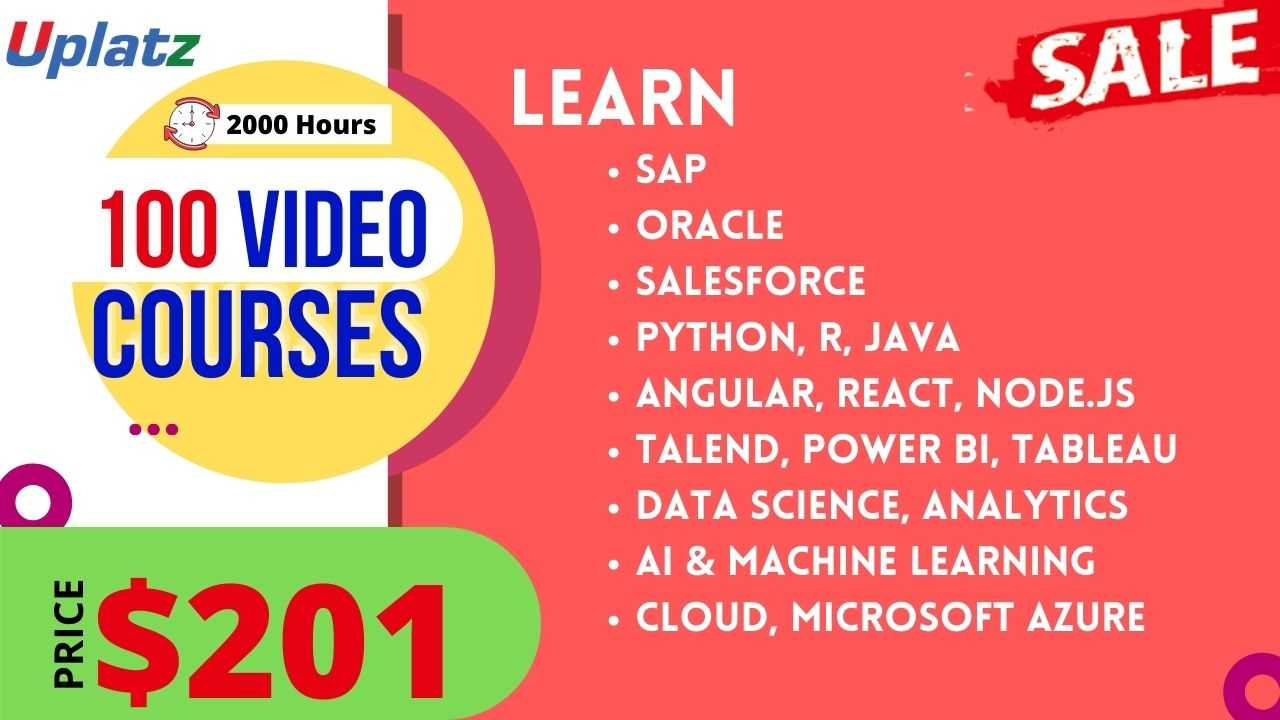Discount Offer - Any 5 Video Courses with Lifetime Access
Get amazing deal this season. Super discounted package of 5 video courses on Technology, Cloud, Data, ML, AI, SAP, Oracle, Python, R, JavaScript, SQL. Price Match Guarantee
Full Lifetime Access
Access on any Device
Technical Support
Secure Checkout
Course Completion Certificate
Price Match Guarantee
Full Lifetime Access
Access on any Device
Technical Support
Secure Checkout
Course Completion Certificate
 90% Started a new career
BUY THIS COURSE (
90% Started a new career
BUY THIS COURSE (USD 63 USD 203 )-
 98% Got a pay increase and promotion
98% Got a pay increase and promotion
Students also bought -
-

- Discount Offer - Any 10 Video Courses with Lifetime Access
- 250 Hours
- USD 112
- 210 Learners
-

- Discount Offer - Any 50 Video Courses with Lifetime Access
- 1000 Hours
- USD 420
- 95 Learners
-

- Discount Offer - Any 100 Video Courses with Lifetime Access
- 2000 Hours
- USD 700
- 178 Learners

Uplatz provides this Discount offer of 5 self-paced video courses on latest technologies & software including a wide variety of trending areas.
You can now simply select any 5 video courses of your choice.
Access will be provided on all 5 courses for lifetime.
Once you have selected the courses that you want, you have the flexibility to swap any course within 1 month of the purchase if you wish to.
After you have purchased this festive sale course, kindly fill up the below Google Form to let us know your choice of the courses. Uplatz team will provide you the relevant access within 24 hours.
| Google Form for your courses selection |
Note - All individual video courses are permitted under this offer. Since bundle courses and career path courses are combo of a number of courses, hence if you select a bundle or a career path course then the number of individual courses under that bundle / career path will be counted towards the total.
Some of the key technology areas covered are:
· BI Tools - Tableau, Power BI, SAS BI, etc.
· Cloud Platforms - Microsoft Azure, AWS, Google Cloud Platform
· Cyber Security - CISSP Certification
· Data Analytics - Google Analytics, MS Excel, Google Sheets
· Data Engineering
· Data Science
· Data Visualization with Python, R
· Digital Marketing
· DevOps Engineering
· Embedded Engineering
· Full Stack Web Development (React, Angular, Node.js, MongoDB)
· Machine Learning & Deep Learning
· MATLAB Programming
· Microsoft Technologies
· Oracle (DBA, PL/SQL, BI Publisher, Forms, APEX, WebLogic, ICS)
· Programming - Java, JSP, Java Servlets, Python, R
· Project Management - Fundamentals, Microsoft Project
· Python & R
· Salesforce
· SAP (40 prominent functional and technical modules such as HCM, FICO, MM, PP, PM, QM, SD, S/4HANA TRM, EWM, Ariba, Hybris, GRC, BW/4HANA, S/4HANA Logistics, BW, BusinessObjects BI, Data Services, HANA, ABAP, SuccessFactors, CPI, MDG, and many more)
· SAS
· SEO (Search Engine Optimization)
· Shell Programming
· Software Testing
· SQL Programming
· Unix & Linux
· Web Design - HTML5 & CSS3
Other key areas on which we have brilliant courses available:
· Accounting & Finance
· Leadership & Management
Course/Topic - Festive Sale - Any 5 Video Courses with Lifetime Access - all courses
-
Buy this mega sale offer course and then select any 5/10/25/50/75/100 video courses of your choice.
Please email to info@uplatz.com mentioning your choice.
We will then provide you access to these video courses.
Grow your career in any technology like;
· Cloud Platforms - Microsoft Azure, AWS, Google Cloud Platform
· Cyber Security - CISSP Certification
· Data Analytics - Google Analytics, MS Excel, Google Sheets
· Data Engineering
· Data Science
· Data Visualization with Python, R
· Digital Marketing
· DevOps Engineering
· Embedded Engineering etc.
Below is a comprehensive list of popular IT and tech certifications.
1. CompTIA A+ (IT Fundamentals): Entry-level certification covering foundational IT skills, suitable for beginners.
2. CompTIA Network+: Validates networking skills, essential for network administrators and support roles.
3. CompTIA Security+: Focuses on cybersecurity skills, demonstrating expertise in securing IT environments.
4. Cisco Certified Network Associate (CCNA): Validates knowledge of networking fundamentals, suitable for network professionals.
5. Cisco Certified Network Professional (CCNP): Advanced Cisco certification for professionals seeking expertise in network technologies.
6. Certified Information Systems Security Professional (CISSP): Globally recognized cybersecurity certification, suitable for security professionals.
7. Certified Ethical Hacker (CEH): Validates ethical hacking skills, essential for penetration testers and security analysts.
8. AWS Certified Solutions Architect: Demonstrates expertise in designing solutions on Amazon Web Services (AWS).
9. AWS Certified DevOps Engineer: Focuses on DevOps practices and demonstrates skills in automating and optimizing AWS environments.
10. Microsoft Certified: Azure Solutions Architect Expert: Validates skills in designing solutions on the Microsoft Azure platform.
11. Microsoft Certified: Azure Administrator Associate: Demonstrates expertise in implementing, managing, and maintaining Azure environments.
12. Project Management Professional (PMP): Widely recognized for project management, relevant for IT project managers.
13. ITIL Foundation: Introduces IT service management best practices, essential for IT service professionals.
14. Certified ScrumMaster (CSM): Validates knowledge of Scrum principles, crucial for Agile development teams.
15. Red Hat Certified Engineer (RHCE): Validates skills in configuring and managing Red Hat Linux systems.
16. Certified Kubernetes Administrator (CKA): Demonstrates expertise in Kubernetes administration for container orchestration.
17. Google Cloud Professional Cloud Architect: Validates skills in designing and managing solutions on the Google Cloud Platform.
18. Certified Information Systems Auditor (CISA): Focuses on information systems auditing and control, suitable for auditors and security professionals.
19. Certified Information Security Manager (CISM): Targets information security management, relevant for security professionals and managers.
20. Certified in Risk and Information Systems Control (CRISC): Focuses on risk management and information systems control, valuable for risk professionals.
21. Certified Wireless Network Professional (CWNP): Various certifications for wireless networking, suitable for professionals in the wireless industry.
22. Salesforce Certified Administrator: Demonstrates skills in configuring, maintaining, and supporting Salesforce implementations.
23. VMware Certified Professional (VCP): Certifications for virtualization and cloud computing, suitable for VMware administrators.
These certifications can enhance your skills, validate your expertise, and potentially lead to career advancement in various IT and tech roles. It's essential to choose certifications aligned with your career goals and the technologies you work with or plan to work with in the future.
- Artificial Intelligence & Machine Learning Engineer
- Business Analyst
- Cloud Engineer
- Data Analyst
- Data Engineer
- Data Scientist
- BI Developer
- Database Administrator
- DevOps Engineer
- Digital Marketing Specialist
- Full Stack Web Developer
- IT Consultant/Manager
- Mobile Apps Developer
- Oracle Consultant
- Project Manager
- Salesforce Consultant
- SAP Consultant
- Software Developer
- Software Tester
- UI/UX Designer
Here's a diverse set of 50 interview questions and answers covering data, machine learning, technology, cloud, and cybersecurity topics.
Data topics:
1. What is the difference between structured and unstructured data?
• Answer: Structured data is organized and follows a fixed schema, while unstructured data lacks a predefined structure.
2. Explain the concept of normalization in databases.
• Answer: Normalization is the process of organizing data to reduce redundancy and improve data integrity in relational databases.
3. What is the purpose of ETL in data processing?
• Answer: ETL (Extract, Transform, Load) is used to extract data from source systems, transform it to fit business needs, and load it into a data warehouse.
4. Differentiate between SQL and NoSQL databases.
• Answer: SQL databases are relational and use structured query language, while NoSQL databases are non-relational and support a variety of data models.
5. Explain the term "Big Data" and its characteristics.
• Answer: Big Data refers to datasets that are too large and complex for traditional data processing methods. Characteristics include volume, velocity, variety, and veracity.
6. What is the significance of data warehousing in business intelligence?
• Answer: Data warehousing aggregates and stores data from different sources, facilitating efficient reporting and analysis for business intelligence purposes.
7. How do you handle missing or null values in a dataset?
• Answer: Techniques include imputation, removing records with missing values, or using algorithms that handle missing data.
8. Explain the CAP theorem in distributed databases.
• Answer: The CAP theorem states that a distributed system cannot simultaneously provide Consistency, Availability, and Partition tolerance. It can achieve two out of the three.
9. What is data mining, and how is it used in analytics?
• Answer: Data mining is the process of discovering patterns and knowledge from large datasets. In analytics, it helps uncover hidden insights and relationships.
10. Describe the differences between data lakes and data warehouses.
• Answer: Data lakes store raw, unstructured data, while data warehouses store structured data optimized for querying and analysis.
Machine Learning topics:
1. What is machine learning, and how does it differ from traditional programming?
• Answer: Machine learning enables systems to learn and improve from experience without being explicitly programmed, in contrast to traditional rule-based programming.
2. What are the main types of machine learning algorithms?
• Answer: The main types are supervised learning, unsupervised learning, and reinforcement learning.
3. Explain the bias-variance tradeoff in machine learning.
• Answer: The bias-variance tradeoff involves finding the right balance between underfitting (high bias) and overfitting (high variance) in a model.
4. What is overfitting in machine learning, and how can it be mitigated?
• Answer: Overfitting occurs when a model learns noise in the training data rather than the underlying patterns. Regularization techniques and cross-validation can help mitigate overfitting.
5. What is the difference between classification and regression in machine learning?
• Answer: Classification predicts categorical outcomes, while regression predicts continuous outcomes.
6. Explain the concept of precision and recall in machine learning evaluation.
• Answer: Precision is the ratio of correctly predicted positive observations to the total predicted positives, while recall is the ratio of correctly predicted positive observations to the total actual positives.
7. What is the purpose of feature engineering in machine learning?
• Answer: Feature engineering involves transforming raw data into a format that enhances the performance of machine learning models.
8. What is a confusion matrix, and how is it used in machine learning?
• Answer: A confusion matrix is a table used to evaluate the performance of a classification algorithm, showing true positives, true negatives, false positives, and false negatives.
9. What is the difference between supervised and unsupervised learning?
• Answer: Supervised learning involves training a model on labeled data, while unsupervised learning deals with unlabeled data to find patterns or relationships.
10. Explain the concept of ensemble learning.
• Answer: Ensemble learning combines multiple models to improve overall performance and reduce overfitting.
Technology topics:
1. What is the role of a load balancer, and how does it work?
• Answer: A load balancer distributes incoming network traffic across multiple servers to ensure no single server is overwhelmed, improving performance and reliability.
2. Explain the concept of virtualization.
• Answer: Virtualization involves creating virtual instances of resources such as servers, storage, or networks, enabling efficient use of hardware and improving scalability.
3. What is containerization, and how does it differ from virtualization?
• Answer: Containerization encapsulates applications and their dependencies, allowing them to run consistently across various environments. It is more lightweight than virtualization.
4. What is microservices architecture, and why is it popular?
• Answer: Microservices is an architectural style where applications are composed of small, independently deployable services. It enhances scalability, flexibility, and ease of maintenance.
5. Explain the concept of DevOps.
• Answer: DevOps is a set of practices that aim to bridge the gap between development and operations, promoting collaboration, automation, and continuous delivery.
6. What is the difference between HTTP and HTTPS?
• Answer: HTTPS (Hypertext Transfer Protocol Secure) adds a layer of encryption (SSL/TLS) to HTTP, ensuring secure communication over the internet.
7. Describe the three-tier architecture.
• Answer: Three-tier architecture comprises presentation, application, and database tiers, providing modularity and separation of concerns in software development.
8. What is the role of a firewall in network security?
• Answer: A firewall monitors and controls incoming and outgoing network traffic based on predetermined security rules, enhancing network security.
9. Explain the concept of caching in web development.
• Answer: Caching involves storing copies of frequently accessed data to reduce latency and improve the performance of web applications.
10. What is the difference between symmetric and asymmetric encryption?
• Answer: Symmetric encryption uses a single key for both encryption and decryption, while asymmetric encryption uses a pair of public and private keys.
Cloud topics:
1. What is cloud computing, and how does it differ from traditional IT infrastructure?
• Answer: Cloud computing provides on-demand access to computing resources over the internet, eliminating the need for physical infrastructure.
2. Explain the three main service models in cloud computing.
• Answer: Infrastructure as a Service (IaaS), Platform as a Service (PaaS), and Software as a Service (SaaS).
3. What are the advantages of serverless computing?
• Answer: Serverless computing abstracts server management, offering benefits such as scalability, reduced operational costs, and simplified development.
4. Describe the differences between public, private, and hybrid clouds.
• Answer: Public clouds are hosted by third-party providers, private clouds are dedicated to a single organization, and hybrid clouds combine both public and private elements.
5. What is container orchestration, and why is it important?
• Answer: Container orchestration manages the deployment, scaling, and operation of containerized applications, ensuring they run reliably in a dynamic environment.
6. Explain the concept of auto-scaling in cloud environments.
• Answer: Auto-scaling automatically adjusts the number of resources (e.g., servers) based on demand, optimizing performance and cost efficiency.
7. What is AWS Lambda, and how is it used in serverless computing?
• Answer: AWS Lambda is a serverless compute service that allows developers to run code without provisioning or managing servers, responding to events and scaling automatically.
8. Describe the AWS Shared Responsibility Model.
• Answer: The Shared Responsibility Model delineates security responsibilities between AWS and its customers, emphasizing the shared commitment to security.
9. What is a virtual private cloud (VPC) in AWS?
• Answer: A VPC allows users to create a logically isolated section of the AWS Cloud where they can launch AWS resources in a virtual network.
10. Explain the concept of cloud-native development.
• Answer: Cloud-native development involves building applications specifically for cloud environments, leveraging microservices, containerization, and other cloud-native technologies.
Cybersecurity topics:
1. What is the CIA Triad in cybersecurity?
• Answer: The CIA Triad stands for Confidentiality, Integrity, and Availability—fundamental principles in information security.
2. Explain the concept of a firewall.
• Answer: A firewall is a network security device that monitors and controls incoming and outgoing network traffic based on predetermined security rules.
3. What is the difference between symmetric and asymmetric encryption?
• Answer: Symmetric encryption uses a single key for both encryption and decryption, while asymmetric encryption uses a pair of public and private keys.
4. What is a DDoS attack, and how can it be mitigated?
• Answer: A Distributed Denial of Service (DDoS) attack overwhelms a system with traffic. Mitigation involves filtering malicious traffic and increasing system capacity.
5. Explain the role of an Intrusion Detection System (IDS) in cybersecurity.
• Answer: An IDS monitors network or system activities for malicious activities or security policy violations and alerts administrators.
6. What is the principle of least privilege?
• Answer: The principle of least privilege restricts access rights for users and systems to the minimum necessary to perform their tasks, reducing the risk of unauthorized access.
7. Describe the differences between a virus and a worm.
• Answer: A virus requires a host program to infect, while a worm is a standalone malicious program that can replicate itself.
8. What is multi-factor authentication (MFA), and why is it important?
• Answer: MFA requires users to provide multiple forms of identification, enhancing security by adding an extra layer beyond passwords.
9. What is the role of a Security Information and Event Management (SIEM) system?
• Answer: SIEM systems collect and analyze log data to detect and respond to security incidents, providing a centralized view of an organization's security.
10. Explain the concept of social engineering in cybersecurity.
• Answer: Social engineering is the manipulation of individuals to divulge confidential information, often through deceptive practices.
These questions cover a broad range of topics in data, machine learning, technology, cloud computing, and cybersecurity, providing a comprehensive overview for interview preparation.









